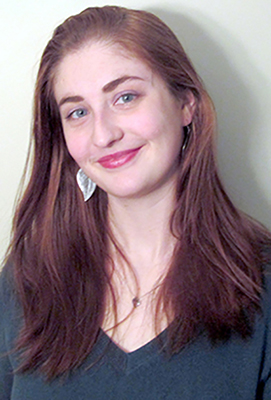Going to the Tapia Conference

My name is Martina Svyantek, and I am a doctoral candidate at Virginia Tech exploring how disability is discussed within institutions of higher education. I share a lot about me and my studies on my portfolio website. I was interested in attending Tapia this year to share how the group I work with, Accessible Technologies, made strides this year with two internal campaigns to get the message across to all people working or attending Virginia Tech that accessibility is an achievable goal. For 2018-2019, we are focused on addressing captioning and color contrast issues with professional development and easy-to-follow guides. We have promoted these campaigns to faculty, staff, and students, urging them to “Keep C.A.L.M. (Choosing Accessible Learning Materials)” in their own work.
My favorite parts of the conference were sharing my own experiences during the “Welcoming Students with Disabilities” panel and getting to know other attendees. While working at the booth with others from AccessComputing, I got to know people who I had only associated with names on papers or emails. I also made a great new friend in Rua Williams, a doctoral student from University of Florida; we now collaborate and push each other to submit our work to different conferences and journals! This new friendship demonstrates why networking is such an important part of going to a conference.
Getting to know new people who are interested in your work is both thrilling and overwhelming—it’s okay to be excited!
To those who have never been to a conference, I would suggest checking the schedule of events before getting to the conference so you can decide what panels or presentations you want to attend, figure out how to travel between rooms, and plan time for meals.
The schedule will also provide a few names of people whose work you think is interesting. You might want to research their other work ahead of time and come up with a game plan to introduce yourself. Getting to know people at a conference is not like an interview, so don’t put too much pressure on yourself!
I’d also like to leave you with some thoughts on conference accessibility. I’ve always found that I have a better conference experience when I request that my access needs be met, instead of trying to ignore them. Supporting others with their requests also helps organizers recognize that accessibility goes beyond ramps and stairs. Considerations such as how rooms are laid out, the presence of microphones, captioning, lighting, food—it all goes into planning. This can be difficult for those unfamiliar with accessibility, which is why the Gender, Bodies, and Technology group reached out and enlisted me as the Accessibility Coordinator for their 2019 conference. Networking with people and my experiences at different conferences led to this opportunity for me to use my knowledge and skills to benefit a larger group. What could going to a conference bring you?